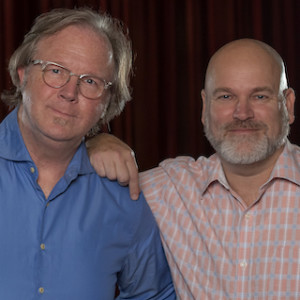
Stories, science and secrets from the world’s brightest thought-leaders. Behavioral Grooves is the podcast that satisfies your curiosity of why we do what we do. Explanations of human behavior that will improve your relationships, your wellbeing, and your organization by helping you find your groove.
Episodes

Sunday May 12, 2019
Russell Golman: On Information Avoidance
Sunday May 12, 2019
Sunday May 12, 2019
Russell Golman is an Assistant Professor of Behavioral Economics and Decision Sciences in the Social & Decision Sciences Department at CMU. His pioneering, interdisciplinary work has been published in a wide range of academic journals, including Science Advances, Decision, the RAND Journal of Economics, the Journal of Economic Theory, the Journal of Economic Perspectives, and the Journal of Economic Literature.
In 2017 Professor Golman organized the Belief-Based Utility Conference at Carnegie Mellon with generous funding from the Russell Sloan Foundation and the Alfred P. Sloan Foundation.
Professor Golman was trained as a game theorist with a Mathematics Ph.D. from the University of Michigan. But whereas game theorists usually assume that people making strategic decisions are hyper-rational, Russell wanted to acknowledge that real people are influenced by each other and sometimes make mistakes. They often care deeply about their beliefs, not just about material outcomes. And they rarely settle into an equilibrium in which everybody is static and content.
Russell’s research interests expanded into behavioral economics and behavioral decision research as well as complex adaptive systems and social dynamics. He took a postdoc in Social and Decision Sciences at CMU, where Herb Simon first conceived of the concept of bounded rationality 50 years earlier. Professor Golman joined the faculty here in 2012.
We talked to Russell about information avoidance and curiosity and to what lengths people will strive for both. In our grooving session, Kurt and Tim discuss information avoidance from a corporate perspective and wonder, “what impact does a manager have when he or she avoids a difficult conversation?” We also talked about ways to reduce information avoidance in the working world and how incentives may help managers through tough situations.
We hope you enjoy this episode in our Carnegie Mellon series with Russell Golman.
Links
Russell Golman: https://www.cmu.edu/dietrich/sds/people/faculty/russell-golman.html
CMU Social and Decision Sciences Department: https://www.cmu.edu/dietrich/
Carnegie Mellon University: https://www.cmu.edu/
Golman, Russell, David Hagmann, and George Loewenstein. “Information Avoidance.” Journal of Economic Literature, 2017, 55: 96-135.
Featured on The Academic Minute
Golman, Russell and George Loewenstein. “Information Gaps: A Theory of Preferences Regarding the Presence and Absence of Information” Decision, 2016, forthcoming.
Golman, Russell, George Loewenstein, Karl Ove Moene and Luca Zarri. “The Preference for Belief Consonance.” Journal of Economic Perspectives 2016, 30: 165-187.
GI Joe Fallacy: https://www.youtube.com/watch?v=GimHHAID_P0
Herb Simon: https://en.wikipedia.org/wiki/Bounded_rationality
Bluegrass music: https://en.wikipedia.org/wiki/Bluegrass_music
Great Blue Heron Music Festival: https://greatblueheron.com/
Donna the Buffalo: https://donnathebuffalo.com/
Jam bands: https://en.wikipedia.org/wiki/Jam_band
The Pines: https://www.youtube.com/watch?v=TuuFampLC6E
The Cactus Blossoms: https://www.youtube.com/watch?v=Qj7jJk8TPZk
Kurt Nelson: @motivationguru and https://www.linkedin.com/in/kurtwnelson/
Tim Houlihan: @THoulihan and https://www.linkedin.com/in/tim-houlihan-b-e/
Check out the Behavioral Grooves website:https://behavioralgrooves.com/

Sunday May 05, 2019
The Value of Understanding Microexpressions for Leaders
Sunday May 05, 2019
Sunday May 05, 2019
Todd Fonseca is an executive in clinical research and communication for Medtronic and holds an interesting array of certifications including Certified Body Language Trainer. He is also the founder of the Anti-Networking Network Meetup and likes to ask meetup guests "What would be your superpower for an hour?" Needless to say, the interview brought interesting concepts to the floor and we had fun doing it.
The interview with Todd included short discussions on the placebo effect, situational awareness, and a lengthy discussion of Paul Ekman PhD's work on microexpressions. The seven key microexpressions (Happiness, Sadness, Anger, Disgust, Contempt, Fear and Surprise) are foundational to human communication and found to be universal - in other words, they exist among people everywhere on the planet. Our conversation delved deep into the identification and application of them.
We grooved on the themes of the importance of having these microexpressions in our communication toolbox and talked about music from the Oh, Hello's and Robert Finley, an artist recently produced by Dan Auerbach of the Black Keys.

Sunday Apr 28, 2019
Julie Downs: From Sexual Health to the Sahel
Sunday Apr 28, 2019
Sunday Apr 28, 2019
Julie Downs, PhD is an associate professor of psychology in the Social and Decision Sciences department at Carnegie Mellon’s Dietrich College and fits perfectly into the cross-disciplinary culture of the group. Her interests have spanned anthropology to healthcare to economics and her zest for each of them is undeniable.
Our discussion with Julie started with some of her latest research on how to help women make the proper vaginal insertion of an HIV-prevention drug. While scientists at the University of Pittsburgh are developing the medicine, Julie is focused on the behavioral aspects including the proper way to apply it because the efficacy of the drug relies on proper application. The drug is extremely low-cost, doesn’t require refrigeration, and can be kept private in otherwise touchy situations with sexual partners.
We also discussed making decisions in an increasingly complex world of what to eat. Fast food is readily available, it’s cheap and easy to acquire for working parents with a hungry family. However, recent research on fast food consumption reveals the calorie counters on the food menus are not having a positive effect on what gets ordered. Julie is working to figure out solutions that make the calorie counts salient with an online ordering app.
In our grooving session, we chat about the concept of friction and how that applies to product development and communications AND we talk about insights we can take from a food ordering app that has a special calorie counter built into it and use those insights in our work.
So, sit back and enjoy another episode in our Carnegie Mellon series with professor Julie Downs.
Links
Julie Downs: https://www.cmu.edu/dietrich/sds/people/faculty/julie-downs.html
Carnegie Mellon University: https://www.cmu.edu/
CMU Social and Decision Sciences Department: https://www.cmu.edu/dietrich/
Truvada: https://www.truvada.com/
Fleshlight. https://www.fleshlight.com/
Sahel Desert: https://en.wikipedia.org/wiki/Sahel
Satisficing: https://en.wikipedia.org/wiki/Satisficing
The Beatles: https://en.wikipedia.org/wiki/The_Beatles
Louie Prima / Jungle Book: https://www.youtube.com/watch?v=rV8HrpOu1FA
Ella Fitzgerald: https://www.youtube.com/watch?v=u2bigf337aU
Queen: https://www.youtube.com/watch?v=A22oy8dFjqc
Hamilton: https://www.youtube.com/watch?v=yvBYOBTkDRk
Kurt Nelson: @motivationguru and https://www.linkedin.com/in/kurtwnelson/
Tim Houlihan: @THoulihan and https://www.linkedin.com/in/tim-houlihan-b-e/
Listen to Behavioral Grooves: https://behavioralgrooves.podbean.com/

Sunday Apr 21, 2019
George Loewenstein: On a Functional Theory of Boredom
Sunday Apr 21, 2019
Sunday Apr 21, 2019
George Loewenstein, PhD is the Herbert A. Simon Professor of Economics and Psychology in the Social and Decision Sciences Department in the Dietrich College of Humanities and Social Sciences at Carnegie Mellon University and is the director of the Center for Behavioral Decision Research.
George received his PhD in economics from Yale but was always interested in topics outside of the field. At one point, he considered switching from economics to another major but was advised to remain: “We need you here,” he was told by a sage researcher. We’re glad he did.
George may not be a household name, but he is a rockstar in the world of behavioral science. Nobel laureate Richard Thaler dedicated his last book, Misbehaving, to George, along with their colleague Colin Camerer. George’s insights into behavior and decision making are legendary and he is recognized as one of the founders of behavioral economics, in part because he was literally at the table when the field was named “behavioral economics.”
During his career, George has indulged his curiosities in research projects that span an incredibly wide variety of topics including risk, confidence, the effects of feelings, emotions, wanting and enjoying sex, sequencing, preferences, bargaining, incentives, privacy, healthy behaviors, investing, empathy, and sympathy…to name but a few. George’s work has been cited nearly 100,000 times in published articles and peer-reviewed papers. He’s not only remarkably curious, but he’s also remarkably productive. His book of essays titled Exotic Preferences is a terrific read and provides some insight into this extremely talented man.
We were excited to have George as a guest because his comments can be so insightful that they can be pondered for hours, and because he is so rarely recorded (and we are grateful to Linda Babcock for her support and participation in our conversation). We focused on some new work George is doing on the subject of boredom with a graduate student, Amanda Markey. We were surprised to learn that their work is breaking ground as there is no comprehensive functional theory for boredom. And in the category of not knowing where a conversation might go, we compared individual experiences of boredom (and flow).
In our grooving session, we discussed some of the implications of boredom in the workplace and ways you could make meetings more successful. We also touched on the temporal nature of attention and George’s comment to “use it or lose it.” Finally, we returned to a favorite topic whether it’s a good idea to listen to music while we work.
We hope you enjoy this rare recorded conversation with George Loewenstein.
Links
George Loewenstein: https://www.cmu.edu/dietrich/sds/people/faculty/george-loewenstein.html
George’s H-Index: https://scholar.google.com/citations?user=8nyQzDsAAAAJ&hl=en
Linda Babcock: https://www.cmu.edu/dietrich/sds/people/faculty/linda-babcock.html
Exotic Preferences: https://global.oup.com/academic/product/exotic-preferences-9780199257072?cc=us&lang=en&
Carnegie Mellon University: https://www.cmu.edu/
CMU Social and Decision Sciences Department: https://www.cmu.edu/dietrich/
Center for Behavioral Decision Research: https://cbdr.cmu.edu/
Richard Thaler, PhD: https://www.chicagobooth.edu/faculty/directory/t/richard-h-thaler
Colin Camerer: http://www.its.caltech.edu/~camerer/camerer.html
Amanda Markey: https://www.linkedin.com/in/amanda-markey-026b5914/
Kurt Nelson: @motivationguru and https://www.linkedin.com/in/kurtwnelson/
Tim Houlihan: @THoulihan and https://www.linkedin.com/in/tim-houlihan-b-e/
Listen to Behavioral Grooves: https://behavioralgrooves.podbean.com/

Wednesday Apr 17, 2019
Silvia Saccardo: Ethics of Decisions and Italian Rap
Wednesday Apr 17, 2019
Wednesday Apr 17, 2019
Silvia Saccardo, PhD is an Assistant Professor of Management in the Social and Decision Sciences department in the Dietrich College of Humanities & Social Sciences at Carnegie Mellon University. Our conversation with Silvia is the fourth in our series on Carnegie Mellon professors.
We sat down with Silvia in Porter Hall on a chilly day at CMU to discuss her findings on how motivated cognition and hidden biases shape our ethical (and unethical) decision-making. Her research on bribery and lying has been published in top peer-reviewed journals and we found her work with the Dictator Game particularly interesting, especially as it relates to measuring what we consider ethical behavior.
Dr. Saccardo uses the Dictator Game in her research in a unique way. In one case, she set up the game to put people in situations where they can lie to other players and the results are fascinating. We also discussed the way people are more likely to give blunt feedback to out-group rather than in-group associates. Her findings reveal very interesting aspects of the human condition and how we respond to it.
In our grooving session, we discuss the impact of what some people might consider small acts of kindness and how those acts may be construed as small acts of bribery in certain situations (i.e., dinners and small gifts).
This conversation triangulated connections between two of our favorite Behavioral Grooves guests and Silvia and we couldn’t help but call attention to them: Francesca Gino, PhD as a fellow Italian American, and Christina Gravert, PhD as a co-author of papers with Silvia.
We also want to thank Silvia for the opportunity to guest lecture and meet a classroom full of her uber-engaged and enthusiastic students. What a treat.
Links
Silvia Saccardo: https://www.cmu.edu/dietrich/sds/people/faculty/silvia-saccardo.html
…and: https://sites.google.com/site/silviasaccardo/home
Carnegie Mellon University: https://www.cmu.edu/
CMU Social and Decision Sciences Department: https://www.cmu.edu/dietrich/
Saccardo, Silvia, Aniela Pietrasz, and Uri Gneezy. "On the Size of the Gender Difference in Competitiveness." Management Science. Forthcoming.
Gneezy, Uri, Christina Gravert, Silvia Saccardo, and Franziska Tausch. "A must lie situation–avoiding giving negative feedback." Games and Economic Behavior 102 (2017): 445-454.
Jovanotti: https://www.youtube.com/watch?v=Ro8PdDjKA3o
Andrea Bocelli: https://www.youtube.com/andreabocelli
Kurt Nelson: @motivationguru and https://www.linkedin.com/in/kurtwnelson/
Tim Houlihan: @THoulihan and https://www.linkedin.com/in/tim-houlihan-b-e/
Listen to Behavioral Grooves: https://behavioralgrooves.podbean.com/

Tuesday Apr 16, 2019
Grooving: Listeners, can you help us?
Tuesday Apr 16, 2019
Tuesday Apr 16, 2019
At this writing, we’ve recorded and published 64 episodes of Behavioral Grooves and we’d like to make sure we’re on the right course for our listeners. If you would be so kind, we would appreciate hearing the answers to two questions at #behavioralgrooves.
Question 1: Why do you listen?
Question 2: What keeps you listening?
Thanks very much and keep on grooving!

Sunday Apr 14, 2019
Danny Oppenheimer: Governance and Helicopter Parenting
Sunday Apr 14, 2019
Sunday Apr 14, 2019
Daniel Oppenheimer, PhD, known to all as “Danny,” is a professor of psychology in the Social and Decision Sciences department in the Dietrich College of Humanities & Social Sciences at Carnegie Mellon University. This is the third episode in our Carnegie Mellon series, and Danny is a researcher with a wide variety of curiosities. His writings have been published in more than 50 peer-reviewed publications, as well as a number of book chapters and media contributions. Among his notable works, he co-authored Democracy Despite Itself: Why a System That Shouldn’t Work at All Works So Well, published by the MIT Press, and Psychology: A Cartoon Introduction, a cartoon book published by WW Norton on, you guessed it, the simple and humorous aspects of psychology.
He is also an esteemed recipient of the Ig Nobel award for his paper titled “Consequences of Erudite Vernacular Utilized Irrespective of Necessity: Problems with Using Long Words Needlessly.” Need we say more?
We spoke at length about how a person’s take on helicopter (and submarine) parenting strongly correlates to their view of governance. These findings cross-party affiliation and self-identification as liberal or conservative and can also vary from topic to topic. All in, it’s a fascinating discussion.
We recorded our discussion with Danny just a couple of weeks before the 2019 college admissions bribery scandal was brought to light. We discuss the implications of Danny’s observations in our grooving session.
Danny shared that he’s lived for long periods without a mobile phone and that he prefers delegating his music selection to radio DJ’s, who might be considered expert in this situation, to bring him new music without the stress of finding it himself.
In our grooving session, we returned to helicopter and submarine parenting styles and how they might impact the next generation of entrepreneurship, corporate policies and management styles. We also spend some time on the ways business leaders manage data inputs from various sources and the potential impact these decisions have.
We hope you enjoy our discussion with Danny and that you subscribe to Behavioral Grooves at the link below. It’s free!
Links
Danny Oppenheimer: https://www.cmu.edu/dietrich/sds/people/faculty/daniel-oppenheimer.html
Carnegie Mellon University: https://www.cmu.edu/
CMU Social and Decision Sciences Department: https://www.cmu.edu/dietrich/
“Democracy Despite Itself: Why a System That Shouldn’t Work at All Works So Well” (MIT Press) https://mitpress.mit.edu/books/democracy-despite-itself
“Psychology: A Cartoon Introduction,” (WW Norton) https://www.goodreads.com/book/show/34068488-psychology
“Easy does it: The role of fluency in cue weighting,” Anuj K. Shah and Daniel M. Oppenheimer, Princeton University: http://journal.sjdm.org/jdm7730.pdf
“The Science of Giving: Experimental Approaches to the Study of Charity” https://psycnet.apa.org/record/2010-23933-000
George Lakoff: https://georgelakoff.com/
Jonathan Haidt & Greg Lukianoff: “The Coddling of the American Mind” https://www.thecoddling.com/
Helicopter parenting: https://en.wikipedia.org/wiki/Helicopter_parent
Free-Range parenting: https://en.wikipedia.org/wiki/Free-range_parenting
Snowplow parenting: https://www.businessinsider.com/parents-call-their-adult-childrens-bosses-snowplow-parenting-2019-4
Submarine parenting: https://www.psychologytoday.com/us/blog/unmapped-country/201603/submarine-parenting
College Admissions Bribery Scandal: https://en.wikipedia.org/wiki/2019_college_admissions_bribery_scandal
Mechanical Turk: https://en.wikipedia.org/wiki/Amazon_Mechanical_Turk
Postmodern Jukebox: http://postmodernjukebox.com/home/
Kurt Nelson: @motivationguru and https://www.linkedin.com/in/kurtwnelson/
Tim Houlihan: @THoulihan and https://www.linkedin.com/in/tim-houlihan-b-e/
Subscribe to Behavioral Grooves: https://behavioralgrooves.podbean.com/

Wednesday Apr 10, 2019
Jeff Galak: High Heels and Hedonic Decline
Wednesday Apr 10, 2019
Wednesday Apr 10, 2019
Jeff Galak, PhD is a professor at the Social and Decision Sciences department in the Dietrich College of Humanities & Social Sciences at Carnegie Mellon University. Jeff’s primary assignment is as an Associate Professor of Marketing in Carnegie Mellon’s Tepper School of Business; however, he is on loan to the Social & Decision Sciences department in the Dietrich College, which is where we caught up with him. This is the second in the series featuring professors from Carnegie Mellon.
Jeff earned his PhD from NYU and often works on research projects across functions, making him a terrific fit for the already-interdisciplinary department of Social & Decision Sciences. He’s so fond of collaboration, he’s even published peer-reviewed papers about how scientific research benefits from it.
Jeff’s research expertise spans a wide variety of topics and interests including consumer behavior, consumer psychology, as well as judgment and decision making. His findings have been published in top academic journals and he has presented his research at top marketing and psychology conferences worldwide. He’s a very curious guy and we found him engaging as he shared his work and the applications of it.
In our discussion with Jeff, he discussed a few of his research initiatives and focused on three areas: (1) his findings in new research on hedonic decline, (2) how high heels became the measure for the social implications of moving to and from a different socio-economic zip codes and (3) we talked about political lies and two primary subcategories we see in political lying: Lies about policies and lies about personal things. His research reveals how we tend to disregard one more than the other.
In our grooving session, we tackle the work and life implications to some of Jeff’s findings. Specifically, we discussed how product developers can create more successful products by leveraging both simplicity and complexity and we discussed implications of high-heeled social changes.
We hope you enjoy our conversation with the very curious researcher, Jeff Galak.
Links
Jeff Galak/CMU: https://www.cmu.edu/tepper/faculty-and-research/faculty-by-area/profiles/galak-jeffrey.html
Jeff Galak/personal: http://jeffgalak.com/
Carnegie Mellon University: https://www.cmu.edu/
CMU Social and Decision Sciences Department: https://www.cmu.edu/dietrich/
On hedonic decline: When It Could Have Been Worse, It Gets Better: The Effect of Uncertainty on Hedonic Adaptation
On socio-economic status and sales of high heels: Trickle-down preferences: Preferential conformity to high status peers in fashion choices
Clayton Critcher, UC Berkeley: https://haas.berkeley.edu/faculty/critcher-clayton/
“Let It Go” (Frozen Soundtrack): https://www.youtube.com/watch?v=L0MK7qz13bU
“Bohemian Rhapsody” (Queen): https://www.youtube.com/watch?v=fJ9rUzIMcZQ
“Bohemian Rhapsody” (Lake Street Dive) https://www.youtube.com/watch?v=KqEiWN44L3M
“The Entertainer” (Billy Joel) “…and they cut it down to 3:05”: https://www.youtube.com/watch?v=ozDSk9XUkrc
Toto (founded in 1977) recorded “Africa” in 1982: https://www.youtube.com/watch?v=FTQbiNvZqaY
“Aja” (Steely Dan): https://www.youtube.com/watch?v=fG2seugAgnU
Kurt Nelson: @motivationguru and https://www.linkedin.com/in/kurtwnelson/
Tim Houlihan: @THoulihan and https://www.linkedin.com/in/tim-houlihan-b-e/
Subscribe to Behavioral Grooves: https://behavioralgrooves.podbean.com/

Sunday Apr 07, 2019
Linda Babcock: Helping Women Build Better Careers at Carnegie Mellon
Sunday Apr 07, 2019
Sunday Apr 07, 2019
This is the first in a series featuring researchers from Carnegie Mellon University’s Social and Decision Sciences (SDS) department in the Dietrich College of Humanities & Social Sciences. We begin with SDS professor, author, researcher and department chair, Linda Babcock, PhD.
Linda is the James M. Walton Professor of Economics at CMU and a member of the Russell Sage Foundation’s Behavioral Economics Roundtable. Linda has served the National Science Foundation and is the founder and faculty director of the non-profit Program for Research and Outreach on Gender Equity in Society (PROGRESS). She’s been a visiting professor at the University of Chicago, the Harvard Business School, and the California Institute of Technology.
Linda’s research intersects economics and psychology where she focuses on negotiations and dispute resolution. Her work has appeared in the most prestigious economics, industrial relations, psychology, and law journals around the world. Her work has been covered by hundreds of newspapers and magazines in the U.S. and abroad, and she has appeared on numerous television and radio programs discussing her work.
In a recent book with Sara Laschever, Women Don't Ask: Negotiation and the Gender Divide, the authors focus on the importance of women initiating negotiations and the authors explore the societal factors that hold women back from asking for what they want.
In our discussion with Linda, we talked about how working women face more than a glass ceiling, they face something like a labyrinth. We covered the importance of negotiations, and how women need to pay attention to the non-promotable tasks they do at work. And we discussed the importance of interdisciplinary work and the tremendous benefits generated by a department like SDS. Linda shares how great it is that economists, psychologists and astrophysicists sit side-by-side to solve problems in the same department.
In our grooving session, we dive deeper into the practical business applications of Linda’s directive for men to stop asking women to do stuff, how the cross-disciplinary groups serve businesses as well as academic institutions, and we revisit her tips on the importance of negotiation and being mindful about what tasks you do at work.
A note of gratitude: We are grateful to Linda for her efforts in coordinating the SDS series. We are also grateful to all the professors who took time to sit with us – we enjoyed each one! In aggregate, this series was a tremendous amount of fun for us to record and publish. Thank you, CMU, and thank you SDS.
Links
Linda Babcock: https://www.cmu.edu/dietrich/sds/people/faculty/linda-babcock.html
Babcock, Linda & Laschever, Sara (2004). Women Don't Ask Negotiation and the Gender Divide, Princeton Press: Princeton, NJ. https://press.princeton.edu/titles/7575.html
Babcock, Linda & Laschever, Sara (2008). Asking for It: How Women Can Use the Power of Negotiation to Get What They Really Want. Bantam Books: New York City. https://www.goodreads.com/book/show/959775.Ask_for_It
Carnegie Mellon University: https://www.cmu.edu/
CMU Social and Decision Sciences Department: https://www.cmu.edu/dietrich/
Robert Cialdini, PhD: https://www.influenceatwork.com/robert-cialdini-phd/biography/
Eagly, A. H., & Carli, L. L. (2007). Through the labyrinth: The truth about how women become leaders. Boston: Harvard Business School Press. https://hbr.org/product/through-the-labyrinth-the-truth-about-how-women-become-leaders/1691-HBK-ENG
Linda Carli, PhD (Wellsley College): https://www.wellesley.edu/psychology/faculty/carli
Alice Eagly (Northwestern University): https://www.psychology.northwestern.edu/people/faculty/core/profiles/alice-eagly.html
Bruno Mars “That’s What I Like” https://www.youtube.com/watch?v=PMivT7MJ41M
Parliament “Bring the Funk” https://www.youtube.com/watch?v=gjKFCYzqq-A
Run DMC “Walk This Way” (Aerosmith cover) https://www.youtube.com/watch?v=4B_UYYPb-Gk
Kurt Nelson: @motivationguru and https://www.linkedin.com/in/kurtwnelson/
Tim Houlihan: @THoulihan and https://www.linkedin.com/in/tim-houlihan-b-e/
Subscribe to Behavioral Grooves: https://behavioralgrooves.podbean.com/

Sunday Mar 31, 2019
Amit Sood: The Ultimate Happiness Doctor
Sunday Mar 31, 2019
Sunday Mar 31, 2019
Looking for a simple 5-step plan to be happier? Our guest has one.
Amit Sood, PhD is an author and physician at the world-renowned Mayo Clinic, in Rochester, Minnesota. He specializes in pediatrics, internal medicine and oncology and he also maintains certificates in acupressure, yoga and reiki. His books include two particularly relevant volumes that formed the basis of our discussion: The Guide to Stress-Free Living and Handbook for Happiness. He’s a remarkably well-rounded and humble healthcare practitioner as well as a highly productive author. It’s clear from talking with him that he cares deeply about his patients and the quality of his work. His passion was inspirational for us and we hope you have the same experience.
Our conversation focused on the topic of happiness: things we do to increase it and things we do to reduce it. Amit shared some fascinating insights into specific things that we can do to increase our happiness and we were glad to speak with him.
In the grooving session, Kurt and Tim wove these insights into a broader fabric of the environment we’re in when we go to work. Specifically, we addressed how different types of interactions – contentious, transactional or affiliative – influence our happiness and our productivity in the office. We also deliberated the human condition’s increasing need for responsiveness and how our patience for what we consider a socially-acceptable wait time is growing shorter.
Finally, Kurt and Tim discussed the importance of intentionality that Amit believes is foundational to living a happy life, which acted as a springboard for Kurt to ask, “What song would you have wanted to write?” That question quickly got our brains into some miraculous and happy dreaming.
We hope you enjoy our discussion with Amit Sood and, if you do, please leave us a very brief review on your favorite listening app.
Links
Amit Sood, PhD: https://www.mayoclinic.org/biographies/sood-amit-m-d/bio-20054879 and https://en.wikipedia.org/wiki/Amit_Sood
Mayo Clinic: https://www.mayoclinic.org/
The Guide to Stress-Free Living: https://www.barnesandnoble.com/w/the-mayo-clinic-guide-to-stress-free-living-amit-sood-md/1115183416#/
Handbook for Happiness: https://www.barnesandnoble.com/w/the-mayo-clinic-handbook-for-happiness-amit-sood-md/1119972623?ean=9780738217857
A Fragile Culture (by Jonathan Haidt): https://www.youtube.com/watch?v=8lFsc-xGz7o
In My Life (Paul McCartney & John Lennon): https://www.youtube.com/watch?v=6xx8h4IBrRY
Eleanor Rigby (Paul McCartney & John Lennon): https://www.youtube.com/watch?v=weN-l8SOiFU
If We Were Vampires (by Jason Isbell): https://www.youtube.com/watch?v=JF45uzdPgd4
People Are People (by Depeche Mode): https://www.youtube.com/watch?v=MzGnX-MbYE4
Kurt Nelson: @motivationguru and https://www.linkedin.com/in/kurtwnelson/
Tim Houlihan: @THoulihan and https://www.linkedin.com/in/tim-houlihan-b-e/
Subscribe to Behavioral Grooves: https://behavioralgrooves.podbean.com/
